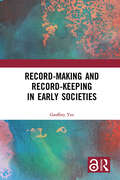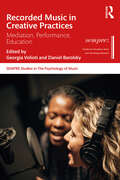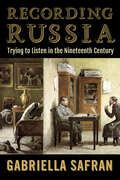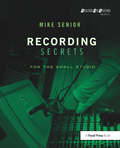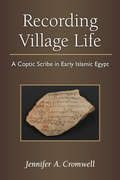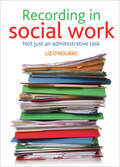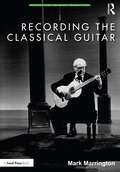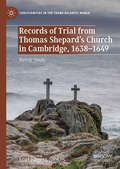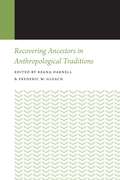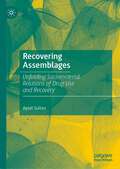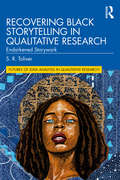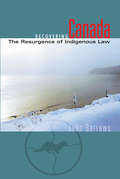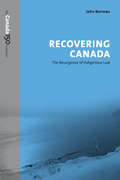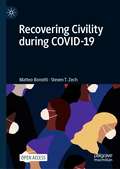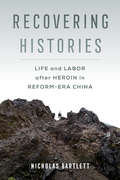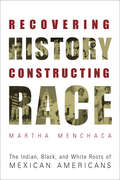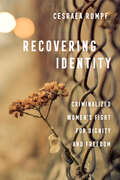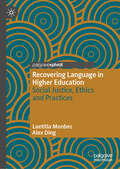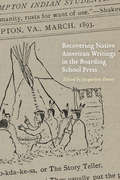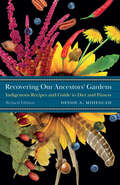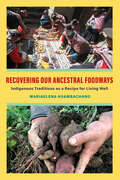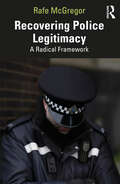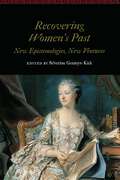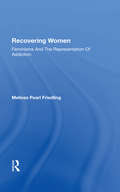- Table View
- List View
Record-Making and Record-Keeping in Early Societies
by Geoffrey YeoRecord-Making and Record-Keeping in Early Societies provides a concise and up-to-date survey of early record-making and record-keeping practices across the world. It investigates the ways in which human activities have been recorded in different settings using different methods and technologies. Based on an in-depth analysis of literature from a wide range of disciplines, including prehistory, archaeology, Assyriology, Egyptology, and Chinese and Mesoamerican studies, the book reflects the latest and most relevant historical scholarship. Drawing upon the author’s experience as a practitioner and scholar of records and archives and his extensive knowledge of archival theory and practice, the book embeds its account of the beginnings of recording practices in a conceptual framework largely derived from archival science. Unique both in its breadth of coverage and in its distinctive perspective on early record-making and record-keeping, the book provides the only updated and synoptic overview of early recording practices available worldwide. Record-Making and Record-Keeping in Early Societies will be of interest to academics, researchers, and students engaged in the study of archival science, archival history, and the early history of human culture. The book will also appeal to practitioners of archives and records management interested in learning more about the origins of their profession.
Recorded Music in Creative Practices: Mediation, Performance, Education (ISSN)
by Daniel Barolsky Georgia VoliotiRecorded Music in Creative Practices: Mediation, Performance, Education brings new critical perspectives on recorded music research, artistic practice, and education into an active dialogue.Although scholars continue to engage keenly in the study of recordings and studio practices, less attention has been devoted to integrating these newer developments into music curricula. The fourteen chapters in this book bring fresh insight to the art and craft of recording music and offer readers ways to bridge research and pedagogy in diverse educational, academic, and music industry contexts. By exploring a wide range of genres, methods, and practices, this book aims to demonstrate how engaging with recordings, recording processes, material artefacts, studio spaces, and revised music history narratives means we can promote new understandings of the past, more creative performance in the present, and freer collaboration and experimentation inside and outside of the recording studio; enhance creative teaching and learning; inform and stimulate reform of the institutional processes and structures that frame musical training; and ultimately promote more diverse music curricula and communities of practice.This book will be of value to educators, researchers, practitioners (performers, composers, recordists), students in music and music-related fields, recording enthusiasts, and readers with a keen interest in the subject.
Recording Russia: Trying to Listen in the Nineteenth Century
by Gabriella SafranRecording Russia examines scenes of listening to "the people" across a variety of texts by Russian writers and European travelers to Russia. Gabriella Safran challenges readings of these works that essentialize Russia as a singular place where communication between the classes is consistently fraught, arguing instead that, as in the West, the sense of separation or connection between intellectuals and those they interviewed or observed is as much about technology and performance as politics and emotions. Nineteenth-century writers belonged to a distinctive media generation using new communication technologies—not bells, but mechanically produced paper, cataloguing systems, telegraphy, and stenography. Russian writers and European observers of Russia in this era described themselves and their characters as trying hard to listen to and record the laboring and emerging middle classes. They depicted scenes of listening as contests where one listener bests another; at times the contest is between two sides of the same person. They sometimes described Russia as an ideal testing ground for listening because of its extreme cold and silence. As the mid-century generation witnessed the social changes of the 1860s and 1870s, their listening scenes revealed increasing skepticism about the idea that anyone could accurately identify or record the unadulterated "voice of the people." Bringing together intellectual history and literary analysis and drawing on ideas from linguistic anthropology and sound and media studies, Recording Russia looks at how writers, folklorists, and linguists such as Turgenev, Dostoevsky, and Vladimir Dahl, as well as foreign visitors, thought about the possibilities and meanings of listening to and repeating other people's words.
Recording Secrets for the Small Studio (Sound On Sound Presents...)
by Mike SeniorDiscover how to achieve commercial-grade recordings, even in the smallest studios, by applying power-user techniques from the world's most successful producers. Recording Secrets for the Small Studio is an intensive training course specifically designed for small-studio enthusiasts who want a fast track to release-quality results. Based on the backroom strategies of more than 200 famous names, this thorough and down-to-earth guide leads you through a logical sequence of practical tasks to build your live-room skills progressively from the ground up. On the way, you'll unravel the mysteries of many specialist studio tactics and gain the confidence to tackle a full range of real-world recording situations. User-friendly explanations introduce technical concepts on a strictly need-to-know basis, while chapter summaries, assignments, and extensive online resources are perfect for school and college use. * Learn the fundamental principles of mic technique that you can apply in any recording scenario -- and how to avoid those rookie mistakes that all too often compromise the sonics of lower-budget productions. * Explore advanced techniques which help industry insiders maintain their competitive edge even under the most adverse conditions: creative phase manipulation, improvised acoustics tweaks, inventive monitoring workarounds, subtle psychological tricks... * Find out where you don't need to spend money, as well as how to make a limited budget really count. * Make the best use of limited equipment and session time, especially in situations where you're engineering and producing single-handed. * Pick up tricks and tips from celebrated engineers and producers across the stylistic spectrum, including Steve Albini, Roy Thomas Baker, Joe Barresi, Tchad Blake, Bruce Botnick, Joe Chiccarelli, Neil Dorfsman, Jack Douglas, Geoff Emerick, Paul Epworth, Humberto Gatica, Nigel Godrich, Andy Johns, Eddie Kramer, Kevin Killen, George Massenburg, Hugh Padgham, Alan Parsons, Jack Joseph Puig, Phil Ramone, Bob Rock, Elliott Scheiner, Al Schmitt, Bruce Swedien, Butch Vig, Tony Visconti, and many, many more...
Recording Village Life: A Coptic Scribe in Early Islamic Egypt
by Jennifer CromwellRecording Village Life presents a close study of over 140 Coptic texts written between 724–756 CE by a single scribe, Aristophanes son of Johannes, of the village Djeme in western Thebes. These texts, which focus primarily on taxation and property concerns, yield a wealth of knowledge about social and economic changes happening at both the community and country-wide levels during the early years of Islamic rule in Egypt. Additionally, they offer a fascinating picture of the scribe’s role within this world, illuminating both the practical aspects of his work and the social and professional connections with clients for whom he wrote legal documents. Papyrological analysis of Aristophanes’ documents, within the context of the textual record of the village, shows a new and divergent scribal practice that reflects broader trends among his contemporaries: Aristophanes was part of a larger, national system of administrative changes, enacted by the country’s Arab rulers in order to better control administrative practices and fiscal policies within the country. Yet Aristophanes’ dossier shows him not just as an administrator, revealing details about his life, his role in the community, and the elite networks within which he operated. This unique perspective provides new insights into both the micro-history of an individual’s experience of eighth-century Theban village life, and its reflection in the macro social, economic, and political trends in Egypt at this time. This book will prove valuable to scholars of late antique studies, papyrology, philology, early Islamic history, social and economic history, and Egyptology.
Recording in social work: Not just an administrative task
by Liz O'RourkeRecording is regarded by most social workers as a necessary evil. The research from which this book arises found that recording is a highly complex and demanding aspect of professional practice. Why has such a critical activity received so little attention, despite the concerns over social work records identified with successive inquiries into tragic deaths? This highly topical book explores the often conflicting demands on social workers as they record information on the case files, and will stimulate a long overdue debate as to how to achieve more effective recording in social work.
Recording the Classical Guitar (Perspectives on Music Production)
by Mark MarringtonRecording the Classical Guitar charts the evolution of classical guitar recording practice from the early twentieth century to the present day, encompassing the careers of many of the instrument’s most influential practitioners from acoustic era to the advent of the CD. A key focus is on the ways in which guitarists’ recorded repertoire programmes have shaped the identity of the instrument, particularly where national allegiances and musical aesthetics are concerned. The book also considers the ways in which changing approaches to recording practice have conditioned guitarists’ conceptions of the instrument’s ideal representation in recorded form and situates these in relation to the development of classical music recording aesthetics more generally. An important addition to the growing body of literature in the field of phonomusicology, the book will be of interest to guitarists and producers as well as students of record production and historians of classical music recording.
Records of Trial from Thomas Shepard’s Church in Cambridge, 1638–1649: Heroic Souls (Christianities in the Trans-Atlantic World)
by Lori Rogers-StokesThis book presents a revolutionary new reading of manuscript records left by puritan minister Thomas Shepard in Cambridge, Massachusetts that have been studied for decades as his on-the-spot recording of oral relations of faith delivered by candidates for church membership. This book proves that these records are not relations, but Shepard’s personal record of sessions of trial—meetings with candidates still working out their spiritual seeking. New transcriptions of the original manuscript records, and corresponding never-before-published writing by Shepard, dispel much of the confusion produced by the published transcriptions. Close-readings of the manuscripts, contrasted with the published transcriptions, set the stage for a new understanding of puritan spiritual preparation in Shepard’s Cambridge church. The book concludes with a challenge to the negative reading of the women’s records that is central to established scholarship, revealing their powerful, confident spiritual identities and voices.
Recovering Ancestors in Anthropological Traditions (Histories of Anthropology Annual)
by Larry Nesper John David Smith Patrick J. Jung Leila Monaghan Vilma Santiago-Irizarry Regna Darnell Frederic W. Gleach Grant Arndt James M. Nyce Joshua Smith Dmitry V. Arzyutov Patrícia Ferraz de Matos Judy Daubenmier Lena Dávila Anna Engelking Kehoe Alice B Nancy Oestreich Lurie Richard J. Preston Sylvia Angelica Smith Dawn Scher Thomae Sandra TolosaRecovering Ancestors in Anthropological Traditions, volume 15 of the Histories of Anthropology Annual, focuses on themes of individual scholars and national developments, with each specific case building toward an understanding of an international discipline. Similar to the cultures that anthropologists study, anthropology&’s four-field discipline contains myriad practices, theories, and methodologies that are often divergent, contradictory, and associated with nationally based schools of thought, contributing to a vital and diverse global discipline. This volume emphasizes the challenges international scholars face as they engage both local and global movements. Several European traditions are represented, including two chapters adding to the body of work on Portugal from previous volumes in the series. North American traditions are well represented, including a collection of works on Nancy Lurie. Also included is an important examination of the collection of human skeletal remains in Argentina, presented in English for the first time. Readers will find both new information and new ways of understanding this complex history.
Recovering Assemblages: Unfolding Sociomaterial Relations of Drug Use and Recovery
by Aysel SultanRecovering Assemblages offers an exciting new insight into the policies and practices of recovery and drug use bridging critical drug studies and the sociology of health and illness. The book investigates lived experiences of young people in Azerbaijan and Germany during their personal recovery from alcohol and other drug use and shows the contingency of 'real' experiences. The sociomaterial and ontological analyses unfold the interrelation of practices, spaces, bodies, and affects in experiencing recovery both within and outside of various treatment facilities. The book will appeal to a range of scholars, postgraduates, and undergraduates engaged in critical, methodological, and empirical studies of recovery, drug use, and policy.
Recovering Black Storytelling in Qualitative Research: Endarkened Storywork (Futures of Data Analysis in Qualitative Research)
by S.R. ToliverThis research-based book foregrounds Black narrative traditions and honors alternative methods of data collection, analysis, and representation. Toliver presents a semi-fictionalized narrative in an alternative science fiction setting, refusing white-centric qualitative methods and honoring the ways of the griots who were the scholars of their African nations. By utilizing Black storytelling, Afrofuturism, and womanism as an onto-epistemological tool, this book asks readers to elevate Black imaginations, uplift Black dreams, and consider how Afrofuturity is qualitative futurity. By centering Black girls, the book considers the ethical responsibility of researchers to focus upon the words of our participants, not only as a means to better understand our historic and current world, but to better situate inquiry for what the future world and future research could look like. Ultimately, this book decenters traditional, white-centered qualitative methods and utilizes Afrofuturism as an onto-epistemological tool and ethical premise. It asks researchers to consider how we move forward in data collection, data analysis, and data representation by centering how Black girls reclaim and recover the past, counter negative and elevate positive realities that exist in the present, and create new possibilities for the future. The semi-fictionalized narrative of the book highlights the intricate methodological and theoretical work that undergirds the story. It will be an important text for both new and seasoned researchers interested in social justice. Informed and anti-racist researchers will find Endarkened storywork a useful tool for educational, cultural, and social critiques now and in the future.
Recovering Canada: The Resurgence of Indigenous Law
by John BorrowsCanada is covered by a system of law and governance that largely obscures and ignores the presence of pre-existing Indigenous regimes. Indigenous law, however, has continuing relevance for both Aboriginal peoples and the Canadian state. In his in-depth examination of the continued existence and application of Indigenous legal values, John Borrows suggests how First Nations laws could be applied by Canadian courts, and tempers this by pointing out the many difficulties that would occur if the courts attempted to follow such an approach. By contrasting and comparing Aboriginal stories and Canadian case law, and interweaving political commentary, Borrows argues that there is a better way to constitute Aboriginal / Crown relations in Canada. He suggests that the application of Indigenous legal perspectives to a broad spectrum of issues that confront us as humans will help Canada recover from its colonial past, and help Indigenous people recover their country. Borrows concludes by demonstrating how Indigenous peoples' law could be more fully and consciously integrated with Canadian law to produce a society where two world views can co-exist and a different vision of the Canadian constitution and citizenship can be created.
Recovering Canada: The Resurgence of Indigenous Law
by John BorrowsCanada is covered by a system of law and governance that largely obscures and ignores the presence of pre-existing Indigenous regimes. Indigenous law, however, has continuing relevance for both Aboriginal peoples and the Canadian state. In his in-depth examination of the continued existence and application of Indigenous legal values, John Borrows suggests how First Nations laws could be applied by Canadian courts, and tempers this by pointing out the many difficulties that would occur if the courts attempted to follow such an approach. By contrasting and comparing Aboriginal stories and Canadian case law, and interweaving political commentary, Borrows argues that there is a better way to constitute Aboriginal / Crown relations in Canada. He suggests that the application of Indigenous legal perspectives to a broad spectrum of issues that confront us as humans will help Canada recover from its colonial past, and help Indigenous people recover their country. Borrows concludes by demonstrating how Indigenous peoples' law could be more fully and consciously integrated with Canadian law to produce a society where two world views can co-exist and a different vision of the Canadian constitution and citizenship can be created.
Recovering Civility during COVID-19
by Matteo Bonotti Steven T. ZechThis Open Access book examines many of the challenges posed by the COVID-19 pandemic through the distinctive lens of civility. The idea of civility appears often in both public and academic debates, and a polarized political climate frequently leads to allegations of uncivil speech and behaviour. Norms of civility are always contested, even more so in moments of crisis such as a global pandemic. A focus on civility provides crucial insight and guidance on how to navigate the social and political challenges resulting from COVID-19. Furthermore, it offers a framework through which citizens and policymakers can better understand the causes and consequences of incivility, and devise ways to recover civility in our social and political lives.
Recovering Histories: Life and Labor after Heroin in Reform-Era China
by Nicholas BartlettHeroin first reached Gejiu, a Chinese city in southern Yunnan known as Tin Capital, in the 1980s. Widespread use of the drug, which for a short period became "easier to buy than vegetables," coincided with radical changes in the local economy caused by the marketization of the mining industry. More than two decades later, both the heroin epidemic and the mining boom are often discussed as recent history. Middle-aged long-term heroin users, however, complain that they feel stuck in an earlier moment of the country’s rapid reforms, navigating a world that no longer resembles either the tightly knit Maoist work units of their childhood or the disorienting but opportunity-filled chaos of their early careers. Overcoming addiction in Gejiu has become inseparable from broader attempts to reimagine laboring lives in a rapidly shifting social world. Drawing on more than eighteen months of fieldwork, Nicholas Bartlett explores how individuals’ varying experiences of recovery highlight shared challenges of inhabiting China’s contested present.
Recovering History, Constructing Race: The Indian, Black, and White Roots of Mexican Americans
by Martha Menchaca"Menchaca has accomplished an unprecedented tour de force in this sweeping historical overview and interpretation of the racial formation and racial history of Mexican Americans. " --Antonia I. Castaneda, Associate Professor of History, St. Mary's University The history of Mexican Americans is a history of the intermingling of races--Indian, White, and Black. This racial history underlies a legacy of racial discrimination against Mexican Americans and their Mexican ancestors that stretches from the Spanish conquest to current battles over ending affirmative action and other assistance programs for ethnic minorities. Asserting the centrality of race in Mexican American history, Martha Menchaca here offers the first interpretive racial history of Mexican Americans, focusing on racial foundations and race relations from prehispanic times to the present. Menchaca uses the concept of racialization to describe the process through which Spanish, Mexican, and U. S. authorities constructed racial status hierarchies that marginalized Mexicans of color and restricted their rights of land ownership. She traces this process from the Spanish colonial period and the introduction of slavery through racial laws affecting Mexican Americans into the late twentieth-century. This re-viewing of familiar history through the lens of race recovers Blacks as important historical actors, links Indians and the mission system in the Southwest to the Mexican American present, and reveals the legal and illegal means by which Mexican Americans lost their land grants.
Recovering History, Constructing Race: The Indian, Black, and White Roots of Mexican Americans (Joe R. And Teresa Lozano Long Series In Latin American And Latino Art And Culture Ser.)
by Martha Menchaca“An unprecedented tour de force . . . [A] sweeping historical overview and interpretation of the racial formation and racial history of Mexican Americans.” —Antonia I. Castañeda, Associate Professor of History, St. Mary’s UniversityWinner, A Choice Outstanding Academic BookThe history of Mexican Americans is a history of the intermingling of races—Indian, White, and Black. This racial history underlies a legacy of racial discrimination against Mexican Americans and their Mexican ancestors that stretches from the Spanish conquest to current battles over ending affirmative action and other assistance programs for ethnic minorities. Asserting the centrality of race in Mexican American history, Martha Menchaca here offers the first interpretive racial history of Mexican Americans, focusing on racial foundations and race relations from preHispanic times to the present.Menchaca uses the concept of racialization to describe the process through which Spanish, Mexican, and U.S. authorities constructed racial status hierarchies that marginalized Mexicans of color and restricted their rights of land ownership. She traces this process from the Spanish colonial period and the introduction of slavery through racial laws affecting Mexican Americans into the late twentieth-century. This re-viewing of familiar history through the lens of race recovers Blacks as important historical actors, links Indians and the mission system in the Southwest to the Mexican American present, and reveals the legal and illegal means by which Mexican Americans lost their land grants.“Martha Menchaca has begun an intellectual insurrection by challenging the pristine aboriginal origins of Mexican Americans as historically inaccurate . . . Menchaca revisits the process of racial formation in the northern part of Greater Mexico from the Spanish conquest to the present.” —Hispanic American Historical Review
Recovering Identity: Criminalized Women's Fight for Dignity and Freedom
by Cesraéa RumpfA free ebook version of this title is available through Luminos, University of California Press's Open Access publishing program. Visit www.luminosoa.org to learn more.Recovering Identity examines a critical tension in criminalized women's identity work. Through in-depth qualitative and photo-elicitation interviews, Cesraéa Rumpf shows how formerly incarcerated women engaged recovery and faith-based discourses to craft rehabilitated identities, defined in opposition to past identities as "criminal-addicts." While these discourses made it possible for women to carve out spaces of personal protection, growth, and joy, they also promoted individualistic understandings of criminalization and the violence and dehumanization that followed. Honoring criminalized women's stories of personal transformation, Rumpf nevertheless strongly critiques institutions' promotion of narratives that impose lifelong moral judgment while detracting attention from the structural forces of racism, sexism, and poverty that contribute to women's vulnerability to violence.
Recovering Language in Higher Education: Social Justice, Ethics and Practices
by Alex Ding Laetitia MonbecThis volume provides an original theoretical and practical discussion around language ontology, social theory, ethics, and pedagogy to enhance socially committed teaching and scholarship in Higher Education. The authors focus on language and literacy and English for Academic Purposes provisions in HE and bring together social semiotics (Systemic Functional Semiotics) and Bourdieu’s Field Theory to illuminate the norms and orthodoxies which shape practices in these fields. Part 1 aims to ‘break the illusio’ around language ontology, ethics and pedagogy which hinders social justice aspirations. Part 2 proposes ways to recover meaning and move forward, through deliberate ethical considerations, and a detailed and expanded knowledgebase for language educators. The volume will be of interest to anyone involved in language and literacy in Higher Education.
Recovering Native American Writings in the Boarding School Press
by Jacqueline EmeryRecovering Native American Writings in the Boarding School Press is the first comprehensive collection of writings by students and well-known Native American authors who published in boarding school newspapers during the late nineteenth and early twentieth centuries. Students used their acquired literacy in English along with more concrete tools that the boarding schools made available, such as printing technology, to create identities for themselves as editors and writers. In these roles they sought to challenge Native American stereotypes and share issues of importance to their communities. Writings by Gertrude Bonnin (Zitkala-Ša), Charles Eastman, and Luther Standing Bear are paired with the works of lesser-known writers to reveal parallels and points of contrast between students and generations. Drawing works primarily from the Carlisle Indian Industrial School (Pennsylvania), the Hampton Institute (Virginia), and the Seneca Indian School (Oklahoma), Jacqueline Emery illustrates how the boarding school presses were used for numerous and competing purposes. While some student writings appear to reflect the assimilationist agenda, others provide more critical perspectives on the schools’ agendas and the dominant culture. This collection of Native-authored letters, editorials, essays, short fiction, and retold tales published in boarding school newspapers illuminates the boarding school legacy and how it has shaped, and continues to shape, Native American literary production.
Recovering Our Ancestors' Gardens: Indigenous Recipes and Guide to Diet and Fitness (At Table)
by Devon A. Mihesuah2020 Gourmand World Cookbook Award Winner of the Gourmand International World Cookbook Award, Recovering Our Ancestors&’ Gardens is back! Featuring an expanded array of tempting recipes of indigenous ingredients and practical advice about health, fitness, and becoming involved in the burgeoning indigenous food sovereignty movement, the acclaimed Choctaw author and scholar Devon A. Mihesuah draws on the rich indigenous heritages of this continent to offer a helpful guide to a healthier life.Recovering Our Ancestors&’ Gardens features pointed discussions about the causes of the generally poor state of indigenous health today. Diminished health, Mihesuah contends, is a pervasive consequence of colonialism, but by advocating for political, social, economic, and environmental changes, traditional food systems and activities can be reclaimed and made relevant for a healthier lifestyle today. New recipes feature pawpaw sorbet, dandelion salad, lima bean hummus, cranberry pie with cornmeal crust, grape dumplings, green chile and turkey posole, and blue corn pancakes, among other dishes. Savory, natural, and steeped in the Native traditions of this land, these recipes are sure to delight and satisfy. This new edition is revised, updated, and contains new information, new chapters, and an extensive curriculum guide that includes objectives, resources, study questions, assignments, and activities for teachers, librarians, food sovereignty activists, and anyone wanting to know more about indigenous foodways.
Recovering Our Ancestral Foodways: Indigenous Traditions as a Recipe for Living Well
by Mariaelena HuambachanoBased on over ten years of fieldwork in Peru and Aotearoa New Zealand, Recovering Our Ancestral Foodways explores how Quechua and Māori peoples describe, define, and enact well‑being through the lens of foodways. By analyzing how these two Indigenous communities operationalize knowledge to promote sustainable food systems, physical and spiritual well‑being, and community health, Mariaelena Huambachano puts forth a powerful philosophy of food sovereignty called the Chakana/Māhutonga. She argues that this framework offers a foundation for understanding the practices and policies needed to transform the global food system to nourish the world and preserve the Earth. One of the key features of this book is the development of the author’s original research methodology—the Khipu Model—which will serve as a vital resource for future research on Indigenous ways of knowing.
Recovering Police Legitimacy: A Radical Framework
by Rafe McGregorTransatlantic policing is experiencing an unprecedented crisis of legitimacy, epitomised by public responses to the murders of George Floyd and Sarah Everard during the COVID-19 pandemic. Legitimacy is lost when the police either fail to protect the public or rely on coercion rather than consent to achieve that protection. Recovering Police Legitimacy challenges conventional criminological, political, and public solutions to the problem by approaching it from the bottom up, beginning with policing as a practice constituted by a unique set of excellences, skills, and characteristics.The author draws on his experience as a police officer and on the serial fictions of James Ellroy, David Peace, and Nic Pizzolatto to characterise the practice in terms of heroic struggle, edgework, absolute sacrifice, and worldmaking. These characteristics provide an analytic tool for revolutionising our understanding of the relations among policing as a situated practice, public protection, and police legitimacy and for identifying the different levels at which legitimacy is undermined. His conclusion is that recovery is possible but will be slow in pace and incomplete in scope.Written accessibly for students, police officers, policymakers, scholars, and anyone with an interest in police legitimacy, this is a groundbreaking study of a pressing social problem.
Recovering Women's Past: New Epistemologies, New Ventures (Women and Gender in the Early Modern World)
by Séverine Genieys-KirkFeminist rewriting of history is designed not merely to reshape our collective memory and collective imaginary but also to challenge deeply ingrained paradigms about knowledge production. This feminist rewriting raises important questions for early modern scholars, especially in bringing to life the works of our foremothers and in reconsidering women&’s agency.Recovering Women&’s Past, edited by Séverine Genieys-Kirk, is a collection of essays that focus on how women born before the nineteenth century have claimed a place in history and how they have been represented in the collective memory from the Renaissance to the twenty-first century. Scrutinizing the legacies of such politically minded women as Catherine de&’ Medici, Queen Isabella of Castile, Emilie du Châtelet, and Olympe de Gouges, the volume&’s contributors reflect on how our histories of women (in philosophy, literature, history, and the visual and performative arts) have been shaped by the discourses of their representation, how these discourses have been challenged, and how they can be reassessed both within and beyond the confines of academia. Recovering Women&’s Past disseminates a more accurate, vital history of women&’s past to engage in more creative and artistic encounters with our intellectual foremothers by creating imaginative modes of representing new knowledge. Only in these interactions will we be able to break away from the prevailing stereotypes about women&’s roles and potential and advance the future of feminism.
Recovering Women: Feminisms And The Representation Of Addiction
by Melissa FriedlingThis book is dedicated to the memories of Robert Branham, my professor at Bates College, whose teaching, scholarship, and humanity continue to inspire and sustain me, and to my grandma, Dorothy Grosser, whose beauty, spirit, and love are with me all the time. I would also like to thank Leighton Pierce, Franklin Miller, Michael McGee, Lauren Rabinowitz, Doris Witt, Camille Seaman, and Bruce Gronbeck at the University of Iowa for their wisdom, guidance, generosity, and support. I am especially grateful to Barbara Biesecker, my teacher, colleague, and friend, who offered perceptive comments on the manuscript and unfailing encouragement. My appreciation also goes out to the University of Iowa Graduate College, which assisted me with the award of a Seashore Dissertation Year Fellowship. At Syracuse University, I am indebted to Jane Marsching, Doug Dubois, Mark Durant, Jude Lewis, John Orentlicher, Loren Schwerd, and Owen Shapiro for their art, friendship, and constructive advice. Additional thanks go to John Sloop, and Catherine Murphy, Lisa Wigutoff, and Myia Williams at Westview Press.
